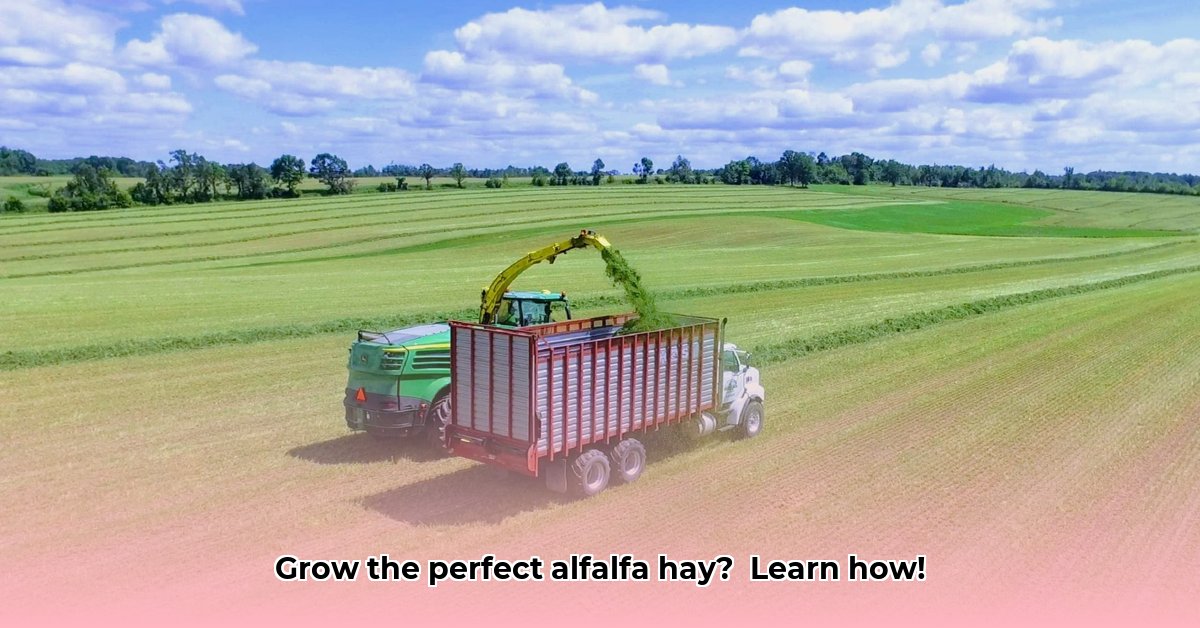
Alfalfa Hay & Tractor Supply: Your Path to Sustainable Farming
Growing alfalfa hay profitably while minimizing environmental impact is achievable. This guide demonstrates how strategic sourcing from Tractor Supply Co. (or comparable agricultural suppliers), combined with smart farming practices, can transform your operation. We'll address key challenges, explore solutions, and provide actionable steps for success. This isn't just about following trends; it's about building a resilient, environmentally conscious, and profitable alfalfa operation.
Sustainable Alfalfa: Beyond the Buzzwords
Sustainable alfalfa farming isn't a fleeting trend; it's a crucial shift towards long-term land and business health. It involves optimizing resource use – water, fertilizer – to maximize yields while minimizing environmental impact. It's about farming smarter, not harder, for sustained success. How can you reduce your reliance on costly and environmentally problematic inputs? What innovative practices can improve your yield while lessening your environmental footprint? These are the central questions we will explore.
Key Strategies for Sustainable Alfalfa Production
- Precision Irrigation: Targeted watering techniques, such as drip irrigation, significantly reduce water waste. Data suggests a 20-30% reduction in water consumption is achievable compared to traditional methods.
- Soil Health Management: Improving soil structure through practices like crop rotation enhances water retention and nutrient uptake, reducing the need for artificial fertilizers.
- Variety Selection: Choosing alfalfa varieties adapted to your specific climate and soil conditions minimizes stress and maximizes yields, potentially lowering input costs.
Optimizing Your Alfalfa Hay & Tractor Supply Strategy
Your approach to sourcing supplies and implementing best practices significantly influences your success. Consider these steps:
- Assess Your Needs: Determine land area, livestock needs, and budget to calculate alfalfa and supply requirements. Accurate planning minimizes waste and maximizes efficiency.
- Plan for Efficient Storage: Employ methods like haylage (fermented alfalfa) to preserve hay quality and extend storage time, minimizing losses and ensuring consistent feed quality throughout the year.
- Partner with Sustainable Suppliers: Choose suppliers committed to sustainable practices. Many companies offer products and support aligned with environmental responsibility. Tractor Supply Co.'s commitment to sustainable practices puts them in a strong position as a supplier.
- Embrace Precision Agriculture Technologies: GPS-guided machinery and soil sensors enhance resource management, increasing yield and minimizing waste. This precise approach optimizes input use and maximizes output, enhancing profitability and sustainability.
- Monitor and Adapt: Regular soil testing informs fertilizer application, preventing overuse. Consistent water usage monitoring, potentially through sensor technology, prevents over or under-watering, optimizing yields while conserving water.
The Benefits of Sustainable Alfalfa Farming
Sustainable practices offer both environmental and economic advantages.
| Benefit | Description |
|---|---|
| Reduced Input Costs | Less fertilizer and water translate to significant cost savings. |
| Enhanced Soil Health | Improved soil structure leads to better water retention and nutrient absorption, boosting overall productivity. |
| Increased Yields | Healthy soil and efficient resource management result in higher alfalfa yields. |
| Superior Hay Quality | Sustainable practices often yield higher-quality hay, improving livestock digestibility and overall health. |
| Strong Market Differentiation | Consumers increasingly favor sustainably produced feed, providing a competitive edge. |
Challenges and Opportunities in Sustainable Alfalfa Production
While sustainable practices offer considerable advantages, initial investments in new technologies and practices might seem daunting. However, Dr. Emily Carter, Agronomy Professor at State University, emphasizes, "The long-term return on investment in sustainable practices far surpasses initial costs. These practices lead to improved soil health, increased yields over time, and reduced reliance on expensive inputs." These long-term gains, coupled with growing consumer demand for sustainably produced feed, create a strong business case for adoption.
Implementing Water-Efficient Irrigation
Precision irrigation is pivotal in reducing water consumption. Numerous methods, including drip irrigation and soil moisture sensors, offer significant water savings. However, Dr. Robert Miller, Agricultural Engineer at the National Agricultural Research Center, advises, "Successful implementation requires careful planning. Soil type, climate, and topography all influence the choice of irrigation system." Consider these steps for efficient implementation:
- Site Assessment: Analyze soil type, slope, and climate to select the most appropriate irrigation method.
- System Design: Consult an irrigation specialist for a customized system design.
- Installation: Ensure proper installation for optimal performance.
- Testing and Calibration: Thoroughly test and calibrate the system for efficient water distribution.
- Monitoring and Maintenance: Consistent monitoring and maintenance are crucial for long-term efficiency.
Beyond irrigation, integrating strategies like drought-tolerant alfalfa varieties and improved soil health management further enhances water conservation efforts. This holistic approach maximizes efficiency and minimizes environmental impact. Are you incorporating these techniques into your farming practices? The future of alfalfa production rests on innovative, sustainable practices.